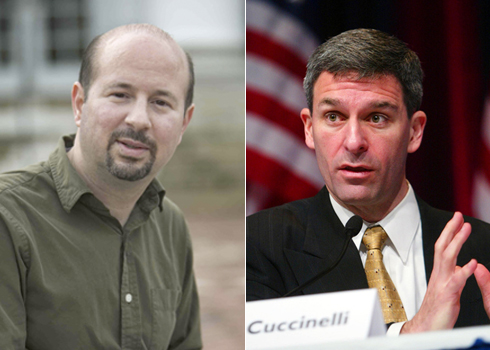An investigation by Ken Cuccinelli of a climate scientist who was caught up in last year’s “Climate-Gate” flap is being likened to a “witch hunt” — even by global warming skeptics.
As we reported yesterday, the conservative Virginia attorney general last month demanded that the University of Virginia hand over a slew of documents relating to the grant-funded research of Michael Mann, a climate scientist who worked at UVA from 1999 to 2005. Among the materials requested by May 27 were email correspondence with a long list of other climate scientists, including several who, like Mann, were prominent figures in Climate-Gate. You can see Cuccinelli’s “Civil Investigative Demand,” first obtained by the The Hook, a Charlottesville newspaper, here.
A spokesman for Cuccinelli declined to comment on the probe to TPMmuckraker, other than to confirm the authenticity of the demand letter. But the AG himself told the Washington Post: “In light of the Climategate e-mails, there does seem to at least be an argument to be made that a course was undertaken by some of the individuals involved, including potentially Michael Mann, where they were steering a course to reach a conclusion. Our act, frankly, just requires honesty.” Cuccinelli already is suing the EPA over its efforts to regulate global warming pollution.
But Mann himself, now the director of the Earth System Science Center at Penn State University, was less reticent. “It seems as if some would rather create distractions to fool the public, rather than confront the reality of human-caused climate change,” he told TPMmuckraker in an email. “I consider that very unfortunate.”
He’s not the only one blasting the probe. Climate-change skeptic Thomas Fuller co-wrote a book on Climate-Gate, published earlier this year, which was harshly critical of Mann and other climate scientists. But in an open letter to Cuccinelli, Fuller urged him to call off the dogs, writing: “No matter what has prompted your investigation, there is no doubt that it will be interpreted as a witch hunt.” He continued: “[B]eing wrong is not a crime, and intimidating scientists not a path that this country, including I presume Virginians, should ever pursue. You may consult with colleagues in Salem to determine how long it takes to live this type of thing down.”
And another climate skeptic, Chip Knappenburger, formerly at UVA, also has compared the investigation to a “witch hunt,” writing online: “I didn’t like it when the politicians came after [climate skeptic] Pat Michaels. I don’t like it that the politicians are coming after Mike Mann.”
Cuccinelli’s demand letter suggests he intends for his investigation to look at Mann’s scientific methods of Mann’s work — a sphere that could be beyond the technical capacity of a law enforcement office, and underlines concerns about the probe’s potential to infringe on academic freedom. In addition to Mann’s email correspondence with other scientists, the AG asks, for instance, for “any and all computer algorithms, programs, source code, or the like created or edited by … Mann” from 1999 to the present, as well as for “any data, information or databases, structured or unstructured information, source code and formulas that may be stored in any format or media type…”
UVA has said it will do its best to comply with the demand, but given the scope of the materials being sought, it may take a while.
The probe appears to be considering whether Mann deliberately manipulated data or otherwise committed fraud in his research. If it found evidence that he did, Cuccinelli could seek to have grant money returned to the government under Virginia’s Fraud Against Taxpayers Act.
There appears to be little reason to think that Mann committed such transgressions, though. The climate-gate emails showed some scientists discussing ways to keep views skeptical of global warming out of peer-reviewed journals, among other things — but they did not show outright fraud. Nor did they undermine the broad expert consensus that man-made warming is occurring and must be addressed.
Mann was a key scholar behind the “hockey stick” graph, which shows global temperatures rising in the 20th century, creating the shape of a horizontal hockey stick. Some climate skeptics have suggested that the Climate-Gate emails threw that finding into doubt. But its basic accuracy has been affirmed in recent years by both the National Academy of Sciences and the Inter-Governmental Panel on Climate Change.
An investigation of Mann’s work by Penn State largely exonerated him. It found that he had not suppressed or falsified data; had not tried to conceal or destroy e-mails or other information; and had not misused confidential information. It also found there was no evidence that he did anything that “seriously deviated from accepted practices” in scholarly research, but asked a larger panel to take a closer look.






